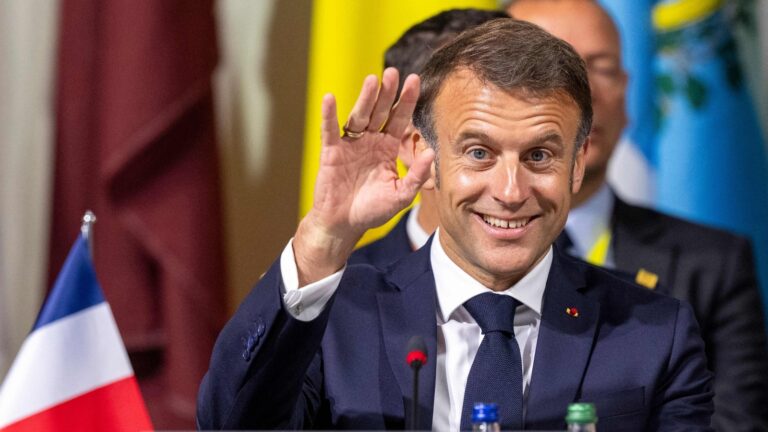Campaigning for France’s early parliamentary elections kicked off on Monday, with opinion polls predicting the far-right National Rally will win ahead of a left-wing coalition, with President Emmanuel Macron’s centrist bloc coming in third.
Political uncertainty has sparked a heavy sell-off in French government bonds and stocks since President Macron suddenly called general elections after Marine Le Pen’s National Rally (RN) party swept past ruling centrist parties in European elections.
Read more: Thousands take to the streets in France to protest against Le Pen’s far-right party ahead of general elections
Macron’s gamble that he can surprise other parties with just a few weeks to prepare for the vote may backfire, a new poll conducted by Ifop for LCI suggests.
Polls predict the eurosceptic, anti-immigration RN will win 33% of the vote in the first round on June 30. That’s two points down from Ifop’s previous poll, but if you add in the percentage of conservative republicans willing to form an electoral alliance with the RN, the total reaches 37%.
The left-wing coalition’s support rate is 28%, up two points, while Macron’s camp is a distant third with 18%, down one point. The second round of voting will take place on July 7.
“We are entering uncharted territory and, in my opinion, heading towards an ungovernable Parliament,” said Maxime Chétris, a 60-year-old voter.
Marie Barta, a retiree from Nimes in the south of France, shared the same concerns but said elections could give parliament more power over presidential and government actions.
Read more: PM Modi and President Macron agree to strengthen strategic defence cooperation, advance ‘Make in India’
“It would be very difficult to create a tripartite parliament with two powerful factions and a much smaller middle group, but it could be an opportunity to return to a more democratic system,” she said.
The starting signal
The official election campaign began on Monday after a week of parties scrambling to field candidates and forge alliances.
Macron’s allies have repeatedly argued that a victory for the RN or the Left could trigger a financial crisis, with Prime Minister Gabriel Attal telling RTL radio that a victory for either side would be devastating for France, its economy and jobs.
But Clementine Autun, a leading lawmaker from the far-left French Insubordinate party, said the damage had already been done by Macron’s previous governments.
“They left us with a huge debt without improving the lives of French people. It is outrageous that they lecture us,” she told a rally of the Left Alliance outside Paris.
France’s budget deficit is set to reach 5.5% of economic output in 2023, well above target and up from the previous year in contrast to other major euro zone countries.
France national football team captain Kylian Mbappe also spoke out, calling on young people to “make a difference” at a time when “extremists” are knocking on the doors of power.
Some far-right politicians said the Frenchman was out of touch with reality.
Read more: Giorgia Meloni’s ‘death look’ at French President Emmanuel Macron goes viral after G7 clash
Macron gathered key ministers and aides on Sunday evening to discuss the election, participants said, adding that his party had decided not to field candidates in around 60 of the 577 constituencies where it thought another mainstream candidate had a better chance of winning.
However, some in Macron’s camp have publicly expressed doubts about early elections.
“This is the president’s decision, his prerogative,” Finance Minister Bruno Le Maire told France Interradio on Sunday.
“What I observe is that it is generating anxiety, incomprehension and sometimes anger among French people in our country and around the world. That’s what I see among voters.”
The RN has already announced significant cuts to energy taxes and a lower retirement age, and is due to announce details of its economic plans in the coming days.
Meanwhile, European Central Bank (ECB) chief economist Philip Lane said the recent market turmoil caused by political uncertainty was “not disorderly” and there was no need for the ECB to bail out France by buying government bonds.
This article has been published from a news agency feed without any modifications to the text. Only the headline has been changed.

